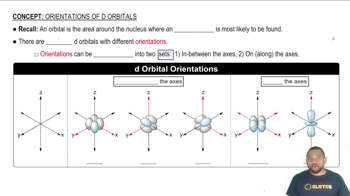Here are the essential concepts you must grasp in order to answer the question correctly.
Collision Theory
Collision theory posits that for a chemical reaction to occur, reactant molecules must collide with sufficient energy and proper orientation. Not all collisions result in a reaction because only those that meet these criteria can overcome the activation energy barrier, which is the minimum energy required for the reactants to transform into products.
Recommended video:
Activation Energy
Activation energy is the energy threshold that must be surpassed for a reaction to proceed. It represents the energy needed to break bonds in the reactants and form new bonds in the products. If the energy of the colliding molecules is below this threshold, the collision will not result in a reaction, regardless of how frequently collisions occur.
Recommended video:
Molecular Orientation
Molecular orientation refers to the specific alignment of reactant molecules during a collision. For a reaction to occur, the molecules must collide in a way that allows for the effective overlap of their electron clouds, facilitating bond formation. If the orientation is incorrect, even a collision with sufficient energy may not lead to a successful reaction.
Recommended video:
 Verified step by step guidance
Verified step by step guidance


